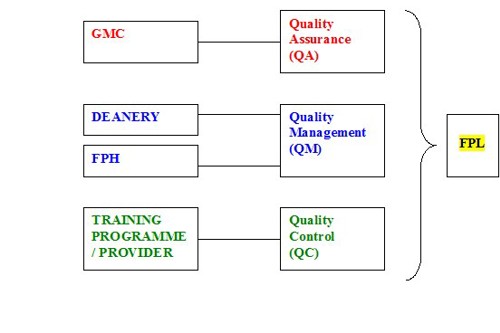Quality assurance
In order to ensure that high standards in training are maintained and are being continually improved, the General Medical Council (GMC) requires that all schools and faculties produce an annual specialty report (ASR) which, along with the National Training Survey, ensures quality in medical education.
Faculty Programme Liaison process
The Faculty Programme Liaison (FPL) process has been developed and adopted by FPH in collaboration with the Public Health Training Programme Directors (TPD) committee, with the aim of:
- Assisting FPH to produce an effective ASR
- Assisting training programmes to deliver high quality training.
- Providing external, experienced and specialty-based advice to deaneries when required.
Postgraduate Medical Education Training Board
The ASR will focus on the college/faculty role in improving the quality of training for doctors and concerns identified through their activity.
All major stakeholder groups involved in specialty training (colleges/faculties, medical schools and bi-annual deanery reports) provide the GMC with annual reports which are compared against one another.
The GMC follow up local concerns which are reported in the ASR but not in the deanery reports.
Included in the college/faculty ASR return is examination data. The GMC will publish ASR and examination data summaries. This enables trainees and the general public to better understand how the college/faculty is contributing to the improvement in medical education and training.
FPH uses the FPL process to gather information and make a submission to the GMC via the ASR process.
The purpose of FPL is to:
- Identify content for the ASR
- Improve the quality of training through identifying and sharing information
- Identify areas of good practice and report these to the GMC.
The FPL process will canvas the training programme directors, registrars and faculty advisors for their comments and feedback on their training experiences which will then be used in preparation of the ASR for the GMC.
FPL suite of documents 2013:
- Introduction
- Registrars' Report
- TPD Report
Quality Framework
The following diagram represent the interactions among the groups involved in the Quality Framework.

Both diagrams have been adapted from the GMC Quality Framework.
If you have any suggestions and comments on the FPL process or Quality Assurance structure please email educ@fph.org.uk


